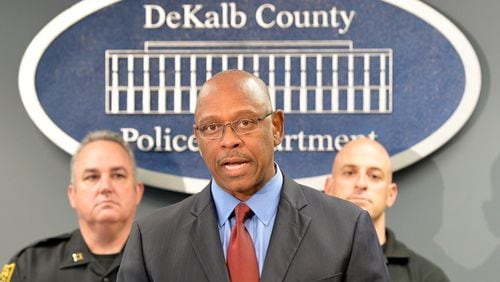DeKalb County Public Safety Director Cedric Alexander told Congress on Tuesday that the entire criminal justice system should be re-evaluated in light of recent events in Ferguson, Mo., New York City and across the country.
From the streets of Atlanta to Los Angeles, widespread protests have followed grand jury decisions not to bring charges against police officers involved in the deaths of unarmed black men Michael Brown and Eric Garner.
Alexander, who is the head of the National Organization of Black Law Enforcement Executives, said DeKalb strives to have a police force that resembles its community in its racial breakdown — which is not the case in Ferguson — and to pursue collaborative “community policing.”
But Alexander said it might be time for communities and the federal government to rethink everything from day-to-day policing to the grand jury process.
“What we’re experiencing every night in this country now is no longer just a fashionable thing, if you will,” Alexander said. “It’s not just a reaction. We’re seeing what is evolving into a movement, just like we saw with the civil rights movements in the ’60s. …
“A great number of people that are marching across this country every night are just American citizens who say, ‘We want to see something different.’ We need, our whole criminal justice system needs to be explored and possibly revamped.
“Now that’s a heavy lift. We understand that, but what we have to do right now is engender in the rest of this country a sense of hope that we’re looking at this.”
A Senate Judiciary subcommittee invited Alexander to testify along with experts and lawmakers about “The State of Civil and Human Rights in the United States” as protests continue to grip the country.
A whole-scale rethinking of the justice system is probably not in the immediate future, but lawmakers have pushed a flurry of proposals since Brown’s death in August. It remains unlikely anything controversial can pass in the lame-duck Congress’ final days.
U.S. Sen. Richard Blumenthal, D-Conn., mentioned during Tuesday’s hearing a bill to mandate local police report officer-involved deaths. U.S. Rep. Hank Johnson, a Lithonia Democrat, has proposed a bill limiting local police departments’ use of military surplus. Alexander backs both ideas.
U.S. Sen. Al Franken, D-Minn., raised the idea Tuesday of blocking federal money for local jurisdictions that do not meet certain community policing standards. President Barack Obama had similar thoughts this week.
"We're going to provide more (funding) to folks who are doing the right thing, and we're going to be investigating folks who are not doing the right thing," Obama told Black Entertainment Television. "I think that becomes an important part of the leverage that we can exert."







